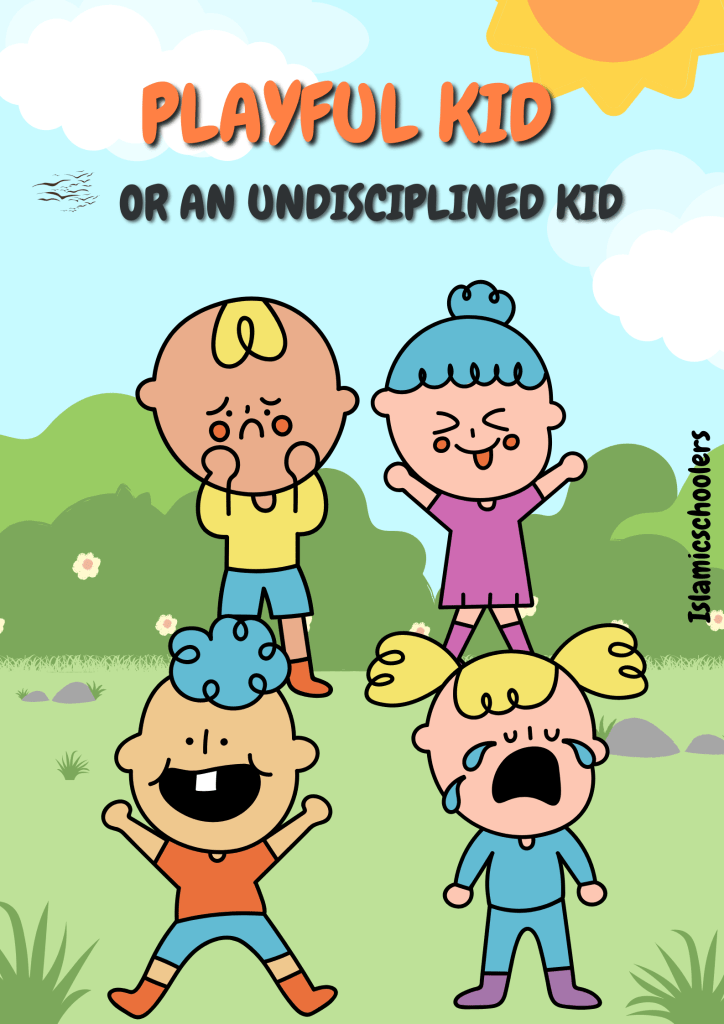A lot of mothers go through the backlash of being bad mothers, when their little active and playful kids are labelled as undisciplined kids. I was one of them too. But people do not understand that there is a great misconception among them regarding the discipline of a child. Mostly expect a 3 year old to behave like a 30 year old. ![]() Let’s go through this article that I have written on this misconception in our society.
Let’s go through this article that I have written on this misconception in our society.

Introduction
In today’s fast-paced world, where productivity and achievement are highly valued, it is easy to misunderstand the nature of playfulness in children. Too often, society tends to equate playfulness with a lack of discipline or a disregard for rules. However, it is time we challenge this misconception and recognize the multitude of benefits that a playful nature brings to a child’s development. In this article, we will explore the importance of embracing a child’s playfulness and discuss effective ways to tackle those who misjudge a playful kid as undisciplined.
1. Understanding the Power of Play
Play is not merely a frivolous activity; it is the language of childhood and an essential part of a child’s growth. It fosters creativity, imagination, problem-solving skills, and emotional intelligence. Play enables children to explore the world around them, learn social skills, and develop resilience. It is through play that children make sense of their experiences and develop a sense of self.
2. Challenging the Misconception
Despite these inherent benefits of play, some individuals overly emphasize discipline and equate it with a well-behaved child. It is crucial to challenge this misconception and educate others about the significant role that playfulness plays in a child’s overall development. By helping others understand the value of play, we can create a more supportive environment for children to thrive.
3. Educate and Inform
When encountering individuals who assume that a playful child lacks discipline, it is important to approach the situation with empathy. Share your knowledge about the benefits of play and its impact on a child’s development. Explain that discipline is not just about adhering to rules but also about possessing self-control and focus. Help them understand that playfulness and discipline coexist harmoniously in a child’s life.
4. Lead by Example
One effective way to tackle those who underestimate a playful child’s discipline is to lead by example. Encourage your child to engage in activities that showcase discipline in action, such as structured sports or performing prayers with you on time. When others witness the discipline your child applies to these pursuits, it challenges their preconceived notions and highlights the balance between playfulness and discipline.
5. Communication is Key
Engage in open and honest communication with those who question your child’s discipline. Share stories and examples of how your child’s playfulness has positively impacted their skills, confidence, and emotional well-being. By providing concrete evidence of the benefits of play, you can help reshape their perspective and break down the stereotype that playful kids lack discipline.
6. Seek Supportive Communities
Building a strong support network is essential when faced with criticism or judgment regarding your child’s playfulness. Surround yourself with like-minded parents, educators, and professionals who understand and appreciate the importance of play. Seek out forums, groups, or organizations that celebrate and advocate for play-based learning.
Conclusion
In a world that places immense pressure on achievement and conformity, it is essential to challenge the misconceptions surrounding playful children and their perceived lack of discipline. By recognizing and embracing the power of play, we can foster a positive environment for children to grow, learn, and develop into well-rounded individuals. Let’s educate others, lead by example, and advocate for the importance of play to break down the barriers that undermine the value of a playful child. Remember, a playful child is not undisciplined, but rather a blossoming individual on a unique path of growth and development.

